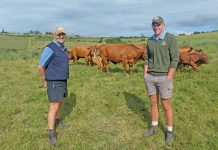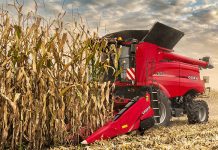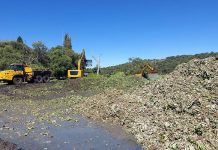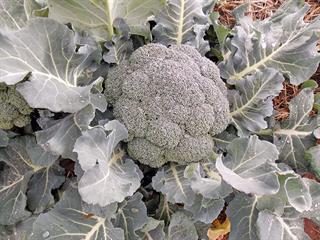‘Nature doesn’t necessarily reward good intentions,’ says Fanie Naude of Denau Farms, whose BEE table grape farm Hoogland lost two consecutive crops to October frost in 2007 and 2008. But misfortune won’t keep Hoogland down – over 100 worker/shareholders depend on it. Wouter Kriel reports.
Denau Farms’ BEE table grape operation, Hoogland, is situated outside the Hex River Valley on the Karoo plateau. After frost destroyed new shoot growth, Hoogland’s 2007 and 2008 crops failed consecutively. “But with very hard work we managed the frost problem this winter, and all indications point towards a first good crop for 2009,” says Denau’s Fanie Naude. Fanie is the son of established Hex River Valley table grape and citrus producer Pieter Naude, Denau’s owner. The Naudes are forward thinkers (see box: Concentrated spraying), and boldly decided to establish table grapes on the Karoo plateau. P ieter bought Hoogland in 2003 with a BEE project for the Denau staff in mind, and developed it from scratch.
The Naudes established 25ha of table grapes under net, and the project was officially handed over in 2005. Today the Denau Workers’ Trust, representing 118 shareholders, owns 50% of Hoogland. other 50% belongs to the Naude family. From 2006 to 2008 a cold store that can hold 40 pallets of grapes, and a packing shed that can process 6 000 cartons a day were built on Hoogland, and another 14ha of grapes were established.
Total production is 14ha Crimson Seedless, 12ha Ralli, 6ha Thomson Seedless and 5ha Sultana grapes. Ralli and are completely covered with nets, and the Crimson protected against wind damage with a net fence. Each cultivar has its own peculiarities. Ralli can have colouration problems, and Crimson needs a lot of pampering to get a good yield. he workers are represented by seven trustees, including Abie Pietersen and Ernest Arendse who represent it on the board of directors, where Pieter and Fanie represent the family. Consults helped train the trustees and new directors for their responsibilities.
Abie is also the production manager on Hoogland. He was a natural choice, with four years experience in Denau’s administrative section. “We have a template of best practices on Denau for all our labour policies, irrigation techniques, vine manipulation and spray programmes,” explains Fanie. “We copy these systems on Hoogland and Abie knows how to implement them correctly.” Abie says, “My admin background helps, and I have people like Ernest to help me with production. He has 21 years hands-on experience on Denau. I can also rely on a very capable foreman, Mervin Willemse.” Managing people is vital in farming today, Abie adds. “Communicating with shareholders is one of the most challenging facets of my job. Since the crop failures, our finances don’t look too rosy. We’re hopeful about the coming season, but explaining to the shareholders that there won’t be any dividends and all profits will need to go back into the business isn’t so easy.”
Denau’s systems for Hoogland
Denau uses a system of small teams each consisting of 12 workers and a team leader, and this has been imported onto Hoogland. Each team is responsible for certain vineyard rows throughout the production cycle. The two farms have slightly different spray and irrigation programmes, since Hoogland is 35km away in a different climatic zone, where its spray programmes need to be slightly delayed. Irrigation on both farms is scheduled via a computer system in the Denau office. “This makes management and control much more efficient,” Fanie says. The environment on the plateau offers unique challenges for table grape production, primarily strong winds, winter frost and bird damage. “Because Hoogland is the only fruit operation in a vast area, it seems birds fly all the way from Beaufort West to eat our grapes,” Fanie comments. “But since Hoogland wasn’t as expensive as land in the Valley would have been, we were able to erect the nets.”
“We had to work hard to solve the frost problems. Nets raise the inside temperature by 1ºC in the evenings, but also prevent airflow, causing favourable frost conditions. We’ve experimented with electrical fans and overhead irrigation, which raise the ambient temperature. This was all done manually throughout this winter – teams had to work from 11pm to 7am, constantly measuring temperatures and managing the fans and sprinklers.”
Frost occurs from mid-September through October, so the team is experimenting with timing our pruning to delay bud break and sensitive shoot growth, though this is still in the trial-and-error phase. The hard work seems to have paid off, as Hoogland is looking forward to its first significant harvest in 2009. “I expect Hoogland to produce 40 000 cartons of Ralli and 20 000 of Sultanas,” says Abie. “We’ll apply for further LRAD funds to install an automatic overhead sprinkler system.” Hoogland has a lot of expansion potential, and the team want to establish 6ha of Red Globe, a cultivar well-suited to the climate. They’re also investigating essential oil production and tourism. Contact Fanie Naude on (023) 357 9727. |fw









